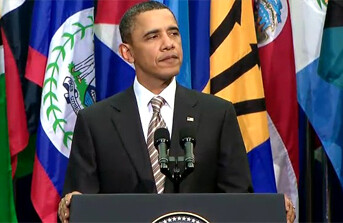United States President Barack Obama will travel to El Salvador this week. Coming into office, Obama seemed to be in tune with Latin America in terms of economic policy. In recent weeks, however, Obama has performed an about-face, and his economic policy toward Latin America is now worse than the draconian policies of his predecessor George W. Bush.
The Bush era was marked by attempts to push NAFTA-style trade treaties in Latin America, despite NAFTA's poor record in Mexico and the rejection of the Washington Consensus in Latin America. Many nations rejected this push—with Brazil shutting down negotiations for a Free Trade Area of the Americas, and Ecuador, Uruguay, and Bolivia pulling out of negotiations with the United States.
One deal that did get through was the Central American Free Trade Agreement (CAFTA), passing in the U.S. Congress by just one vote. Barack Obama voted against CAFTA because, among other things, it did "little to address enforcement of basic environmental standards in the Central American countries."
Obama was right that things wouldn't work out so well under CAFTA.
Since CAFTA went into effect, Central American exports of clothing (the signature export of CAFTA countries) to the United States have fallen by 25 percent. How could this happen? Clothing exports to the United States from Central America were down from $7.5 billion in 2004 to $5.6 billion in 2009, while China's grew to $24.3 billion—a 127 percent increase for China since 2004. The Central American share of U.S. clothing imports has declined to 8.7 percent (down from 12 percent in 2004). China now holds 38 percent of the U.S. import market for clothing.
CAFTA also allows private investors to directly sue Central American governments for what multinational firms see as violations of the agreement. Pacific Rim, a Canadian gold mining company is suing El Salvador in a private World Bank court because El Salvador has attempted to take environmental impact assessments of gold mining seriously.
Canada is not a party to CAFTA, so Pacific Rim shouldn't even be able to use this lever in the first place. Yet under the deal a foreign firm can just set up shop in a CAFTA country and use CAFTA's levers. So, Pacific Rim filed its lawsuit via its U.S. subsidiary.
Pacific Rim seeks damages of approximately $100 million from El Salvador. The claim is almost double the amount of U.S. foreign aid to El Salvador, a country where 34.6 percent of the population lives on less than $2 per day.
The lawsuit has accentuated conflicts over mining in El Salvador. Since it was filed, three anti-mining activists have been killed, including Dora Sorto Recinos—who was eight months pregnant and holding her two-year-old child when she was shot.
On the campaign trail Obama said, "I will ensure that foreign investor rights are strictly limited and will fully exempt any law or regulation written to protect public safety or promote the public interest." As a step toward that pledge when he took office, he set up an advisory committee at the State Department to redo the template for investment provisions in trade treaties.
Recently, however, the administration appears to have abandoned those pledges. At negotiations in Chile for the Trans-Pacific Partnership Agreement—Obama's "alternative" twenty-first century trade deal with Pacific Rim nations—the administration proposed investment text that would solidify and deepen the Bush-era approach to trade and investment. Not only does the U.S. offer leave investor-state dispute resolution intact, it also requires that nations strip their ability to innovate and develop their own flagship firms to compete in the global economy.
Because CAFTA hasn't lived up to its expectations, all Central American nations except the coup leaders in Honduras rejected Canada's recent request to sign a trade treaty like CAFTA with Canada.
Obama could have been on real high ground on this trip, saying "I told you so." He voted against CAFTA and pledged to reform the template from which CAFTA was made. Instead he is behind the curve on Latin America once again and side-stepping the fact that he was once on the right side of these issues.




